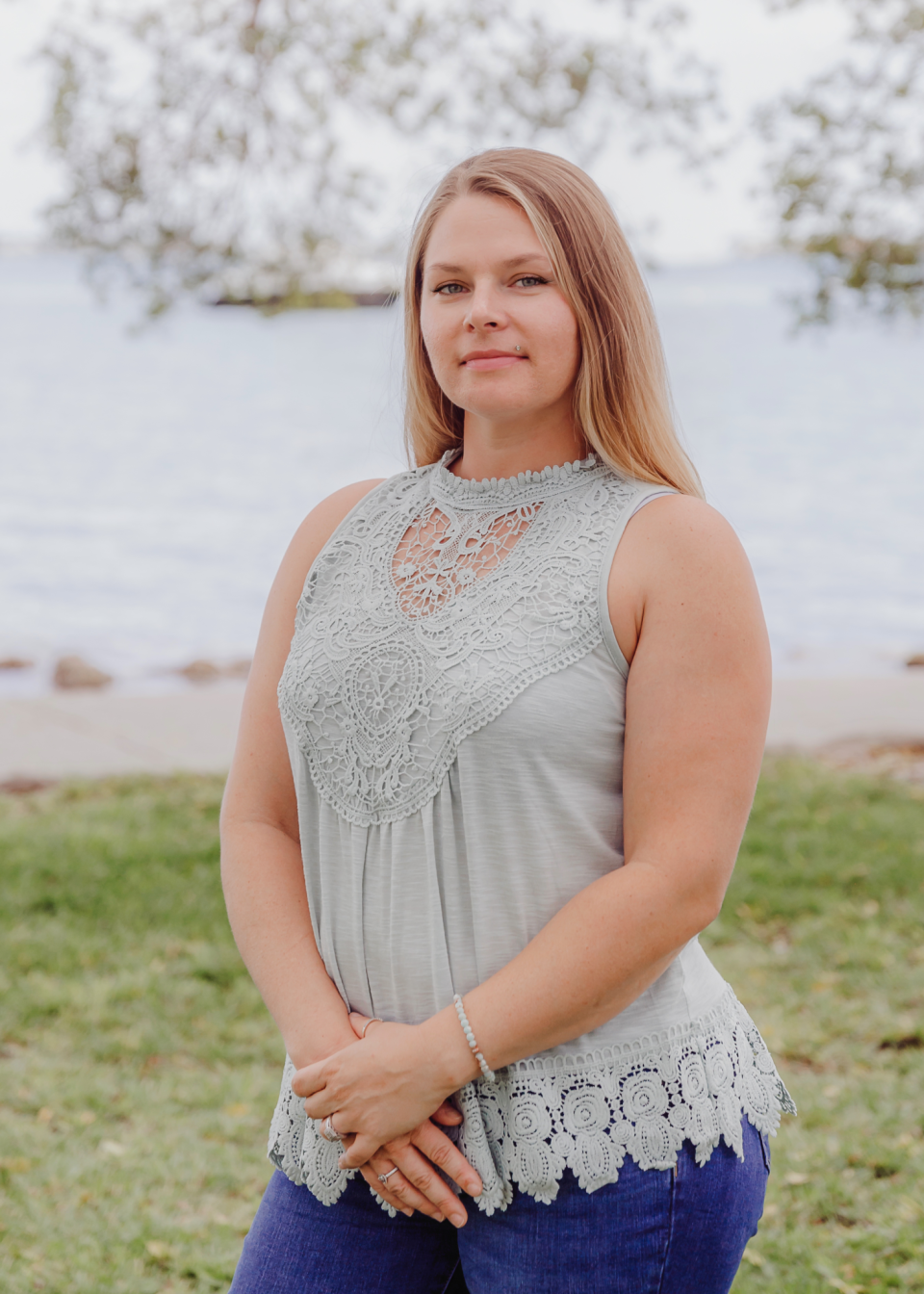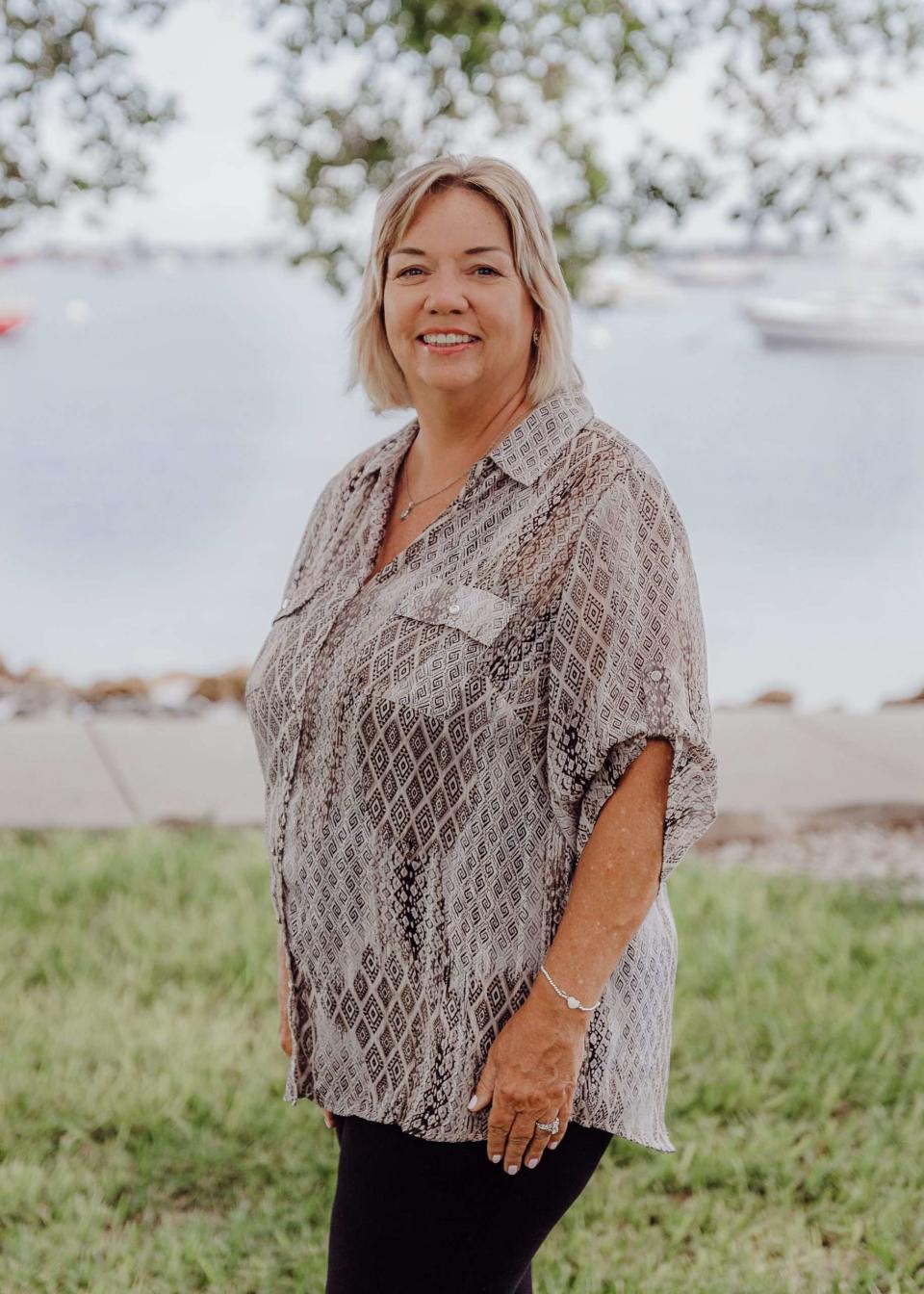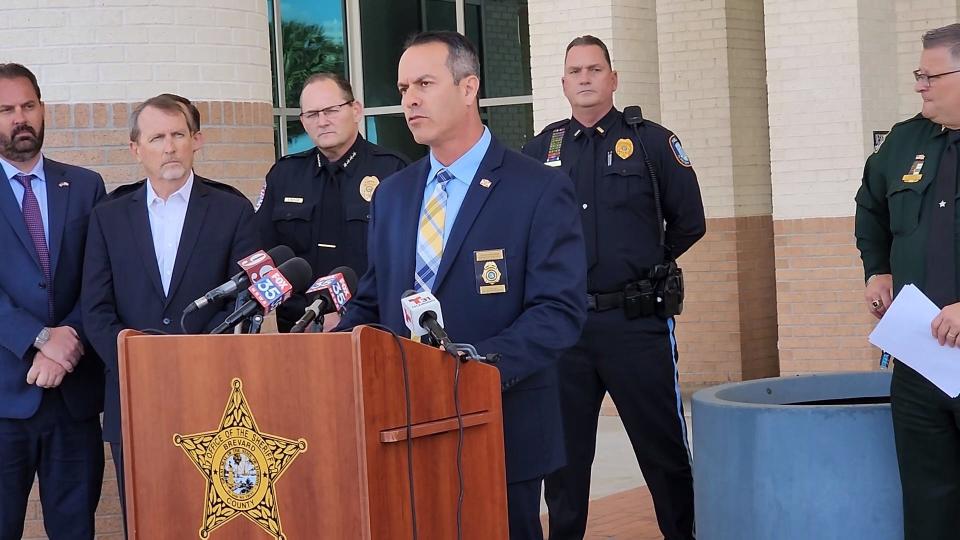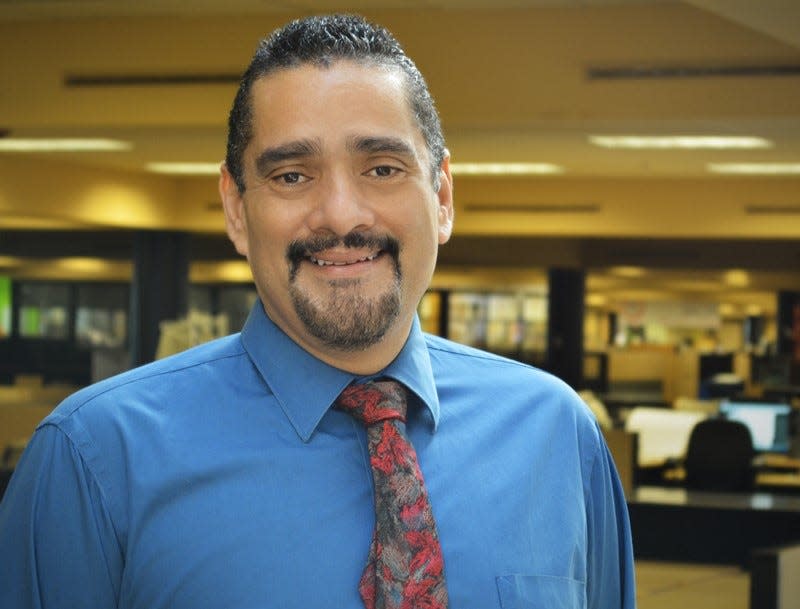A sex trafficking survivor nearly died trying to get out. How she turned her life around.
- Oops!Something went wrong.Please try again later.
If you or someone you know is the victim of human trafficking, call the National Human Trafficking Hotline at 888-373-7888 or call 911 if someone is in immediate danger.
Gabrielle Triplett was trapped. A virtual prisoner to her drug addiction and literal prisoner of the man who was trafficking her.
And when that man learned of her plot to escape prostitution, he shot her in the chest. The bullet coming to rest about an inch from her heart.
His grip over her was so powerful that Gabrielle even covered for him when he allowed her to call 911, saying it was someone else who shot her. She even continued covering for him when a detective questioned her at the hospital.
"I didn't identify as a trafficking victim or anything like that, I just saw myself as a prostitute," she said. "I put myself in these situations."
January is National Human Trafficking Awareness Month, and few places need to be more aware than here in Florida. The state ranks third nationally behind California and Texas for the most reported sex trafficking cases, according to the Florida Alliance to End Human Trafficking.
Childhood trauma left sex trafficking survivor vulnerable
Like many sex trafficking victims, Gabrielle's issues began with a childhood trauma that went unresolved.
What followed reads like a blueprint for victims of sex trafficking. It also reads like a nightmare as a real-life monster preyed on her.
"This childhood trauma pushed me to be very insecure and to seek validation in all the wrong places," the Sarasota woman told me recently. "I started hanging out with the wrong kids growing up and stuff and I just fell into drugs at a very young age."

Gabrielle dropped out of school in the 10th grade and had her first child by the time she was 18.
"I didn't have anybody around me to speak life into me, like words of encouragement help me along," she continued. With the childhood trauma still haunting her, Gabrielle turned to drugs. "I was in full blown addiction and homeless on the streets alone."
And that's when a trafficker approached, promising more drugs if she would do what they said.
"I just had no self worth at this point and, well, I was a prostitute on the streets," she said.
'Sound of Freedom' gets it wrong: 'Sound of Freedom' misleads audiences about the horrible reality of human trafficking
Saved by her 'God moment'
According to Saved in America, human trafficking is a $99 billion dollar business that affects a lot more of our vulnerable young population than most of us can imagine. There are more than 300,000 missing children in our country each year, and a third of those are being trafficked.
But it's not just children, and it's not just unwitting migrants being sold into sexual servitude.
It's also people like Gabrielle.
Over the years, more traffickers took control of her, using her lack of self-worth and her addiction as a means of control. Her final trafficker was the most abusive of all, choosing to shoot her in the chest rather than see her escape his control.
When Gabrielle was released from the hospital, she remained a full-blown drug addict. She returned to the streets.
"That's all I know," she said. "That's all I was good for."
Ashley Judd: We have the power to help women and girls caught in crises. Why won't we?
Of course, Gabrielle was wrong. And it wasn't long after that everything would change in what Gabrielle refers to as a "God moment." That's when she was picked up on a warrant for driving with a suspended license. Forced to do 30 days in the county jail, she sobered up.
She met a chaplain who introduced her to God and shared Jesus with her.
That one conversation changed her entire way of thinking. The desire to return to the streets was replaced with a desire to seek help.
"I told the detective I wanted help. I didn't want to live life like that anymore." And that's when she was sent to Selah Freedom. "That was the first time I actually felt genuine love. And the support and care I received? I mean, it has totally just totally changed my life."
She went on to earn her GED diploma and then an associate's degree. She owns her first home, has been sober for six years and has an amazing job she loves.
Luckily for Gabrielle there was a place like Selah Freedom that offered help. Selah Freedom is a faith-based nonprofit anti-human trafficking organization, based in Florida and the Midwest, trying to put a dent in sex trafficking statistics. Their mission statement reads in part, "To end sex trafficking and bring freedom to the exploited through five strong programs: Awareness, Prevention, Outreach, Residential and Consulting."
Laurie Swink, co-founder of Selah Freedom, said the first step needed is to get victims into therapy.

"We get them into trauma therapy immediately," she said. "Not all of our survivors, but most of our survivors were sexually abused as children. When that happens you don't know what to do with it and you don't know who to go to. Then it just becomes this very deep hurtful wound that too many times we look at people and go, 'Oh, you're addicted to drugs or you're an alcoholic or you are cutting, you have eating disorders' – when in reality those are symptoms of the very hurt that's happened in this very significant place in that person's soul."
If you're thinking this happens elsewhere, you're wrong.
'She doesn't have a voice': They took her daughter on unfounded claims. Then they kept her.
Who is vulnerable to human trafficking?
Just last May, a 27-year-old Rockledge man was sentenced to 12 years in prison followed by 10 years of probation after he trafficked a 15-year-old girl and shopped illicit videos of the pair on social media. Temrom Juan McFarlane pleaded guilty to 60 counts of child pornography, human trafficking, interference with custody, promoting sexual performance by a child and use of a child in a sexual performance.
Opinion alerts: Get columns from your favorite columnists + expert analysis on top issues, delivered straight to your device through the USA TODAY app. Don't have the app? Download it for free from your app store.
In 2022, an Indian River County man and a Palm Bay woman were arrested after investigators said the pair recruited underage girls – including at least two from a group home – to perform sex acts for cash at a West Melbourne hotel. Marc Phillips Dinkels, 33, and Taylor Kathleen Brandt, 19, were arrested as part of a joint investigation led by the Florida Department of Law Enforcement. One of the girls was only 14 years old and in foster care.
"Human Trafficking investigations are a top priority for the Florida Department of Law Enforcement. FDLE agents in Brevard County and around the state actively conduct investigations targeting human traffickers with the goal of arresting the offenders and rescuing the victims," said Brevard's Resident Agent in Charge, Jason Kriegsman. "Many human trafficking victims share common characteristics that make them vulnerable to traffickers."
He said victims often:
Come from countries or communities with high rates of crime, poverty and corruption.
Lack opportunities for education.
Lack family support.
Have a history of physical and/or sexual abuse.
"Due to these characteristics and others, investigators can run into some unique challenges during investigations and rescue attempts," Kriegsman continued. "One challenge is that victims and witnesses are often more reluctant to cooperate with investigations. This could be for a number of reasons: fear of retaliation, dependence on money from the offenders, and most of all, they often place the blame on themselves and feel like they are not deserving of help. But these challenges can be overcome, and the victims can get a second chance at life."

What can you do to help?
Swink said to be vigilant, and don't be afraid of calling the National Human Trafficking Hotline at 888-373-7888 or call 911 if someone is in immediate danger.
"Maybe you're in a nail salon, and you see that there is a an older man with a very young girl and he is hovering over her and grabbing her cellphone. That's probably something that you need to report. I always say it's better to report and be wrong than to be right and not report," Swink said. "If you see windows that are boarded up and you know there's people in there, or you see a lot of activity happening you may think oh maybe it's just drugs. But maybe it's more than just drugs."
Maybe it's someone who needs help but feel they don't deserve it or feel they have no choice.
"So many times people think they have to keep the secret because of shame or guilt," Swink said. "They feel like they can't share it with anybody. But the best thing you can do is go to a trusted person and share with them what has happened."
If you keep it inside, let it fester, the monsters are bound to find you.

John A. Torres is the opinion and engagement editor at Florida Today, where this column first published. Contact him at jtorres@floridatoday.com. You can follow him on X, formerly known as Twitter: @johnalbertorres
You can read diverse opinions from our Board of Contributors and other writers on the Opinion front page, on Twitter @usatodayopinion and in our daily Opinion newsletter.
This article originally appeared on Florida Today: Do you know what human trafficking looks like? Here's how you can help

